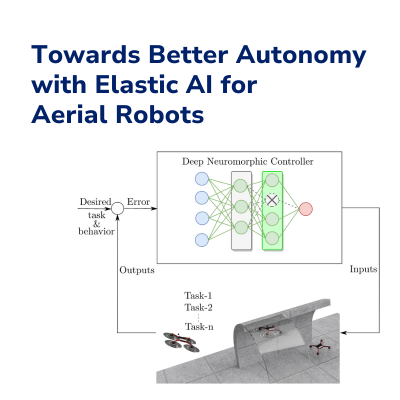

ARPAS-UK has today published its first Drone in Action Report. The purpose of this guide is to provide examples which demonstrate the range of benefits and financial savings that can be achieved by the safe adoption of Drones.
Graham Brown, Chair of ARPAS-UK says, “When applied, drones are faster, cheaper, safer and greener than other solutions for the same job. We want businesses, as well as the general public, to understand the immense benefit of drones and understand that there will be positive adoption over the coming years.”
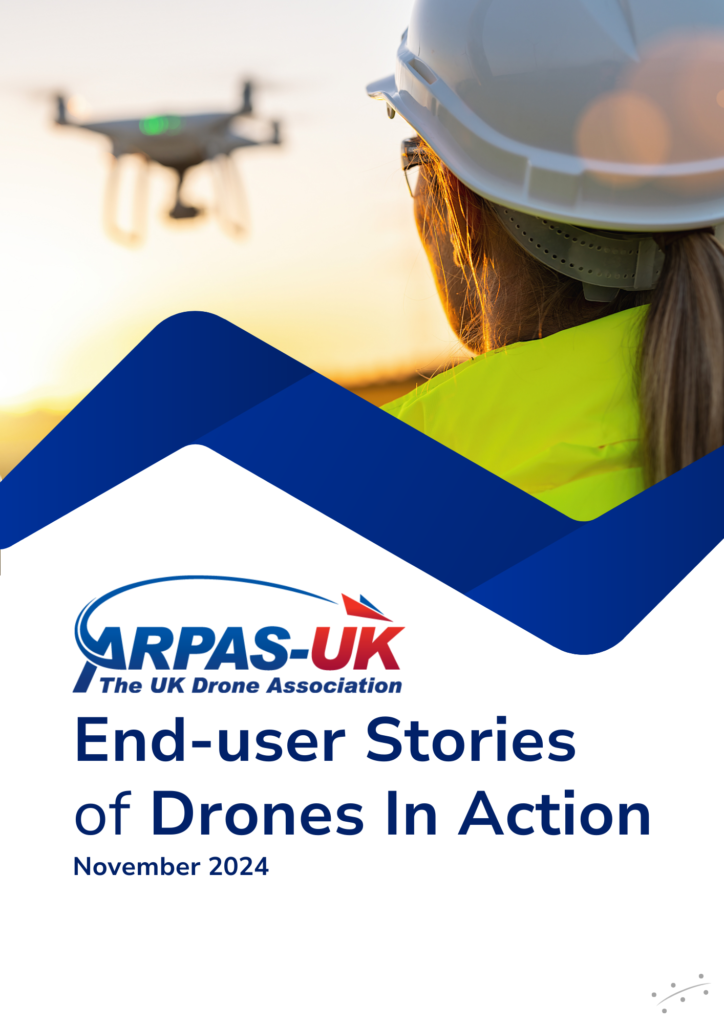
In the dynamic landscape of technological advancement, the safe adoption of drone technology stands as a testament to innovation, human ingenuity and its capacity to redefine and improve industrial operations. This report examines a collection of use cases across a spectrum of sectors, each showcasing the transformative impact of drones. From asset and building inspection to the precision agriculture fields to the complex infrastructures of oil and gas platforms, we explore how uncrewed aerial vehicles or drones are not just enhancing operational efficiency but also creating the path towards a safer, more sustainable future.
Author: Mohammed Hasan
Support by: Graham Brown, Anne-Lise Scallierez, Aleksander Kowalski, Chris Daniels, Sarah Lay, David Thurston, Rupert Dent, Elena Major, Annabel Worthington, Ashna Sharma, Dylan Brooks & Prajjwal Roy
Graphics: Sam Barrett, Manna & Canva
View further Drones & Industry Reports
12 November 2024

ARPAS-UK is thrilled to announce a ground-breaking partnership with SAADEF, the Saudi Arabian AI & Drone Exhibition Forum, taking place from the 4th-6th of November in Riyadh, Saudi Arabia. This collaboration signifies an incredible opportunity for ARPAS-UK to extend its reach into the Middle East, a region poised for rapid expansion in drone technology and AI applications. Representing the UK drone industry, Mohammed Hasan will lead the ARPAS-UK delegation at the exhibition, showcasing the innovation and expertise of our members to a global audience.
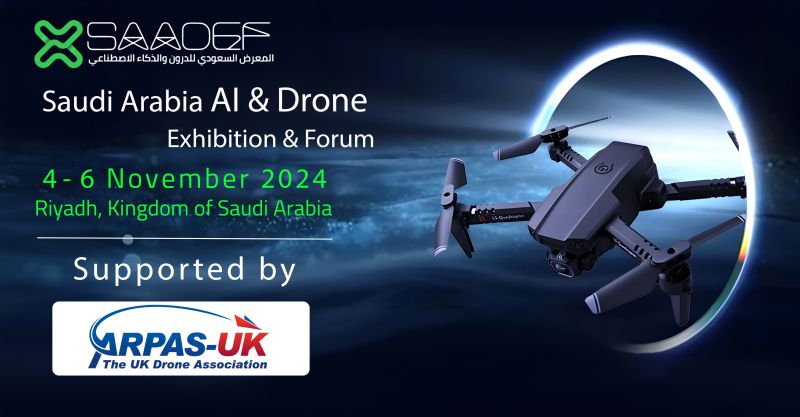
For ARPAS-UK Members:
This partnership provides unparalleled exposure to a booming international market, allowing members to gain visibility among Middle Eastern stakeholders, government bodies, and private enterprises with interests in drones, AI, and advanced air mobility. Through this event, ARPAS-UK aims to create new avenues for collaboration, sharing knowledge, and aligning with emerging global standards.
Networking and Expansion Opportunities:
As members of ARPAS-UK, this collaboration offers you a channel to explore partnerships beyond UK borders, fostering cross-cultural exchanges and promoting your work on an international platform. By joining our delegation, you have the chance to network with key players in the Saudi market and beyond, giving you insights into local demands, potential clients, and future prospects in a rapidly evolving region.
Invitation to Participate:
To maximise member representation, we invite all interested members to submit an A4 poster summarising your company’s services, recent projects, or drone innovations to [email protected]. These posters will be featured prominently at our stand, ensuring your work reaches an audience of global industry leaders and potential collaborators.
Get Involved in Shaping ARPAS-UK’s Middle East Strategy:
Beyond the exhibition, we are also compiling a list of member interests regarding the Middle Eastern market. If you have specific areas of interest, whether in direct partnerships, regional insights, or unique applications for drones and AI within the Middle East, please get in touch. Together, we aim to create a tailored approach that maximises the benefits of this partnership for all our members, paving the way for an annually revived collaboration with even greater potential in the future.
This partnership represents ARPAS-UK’s commitment to supporting our members as the drone industry expands globally. Join us as we seize the opportunity to foster growth, knowledge-sharing, and innovation on a global scale.

In this webinar, DJI presents real-world enterprise use cases that showcase the practical applications of DJI solutions across sectors. Additionally, they provided a comprehensive overview of data security measures integrated into their products, ensuring that daily operations remain secure and compliant. DJI: Enhancing Safety and Efficiency.
Speaker Bios:

Freda Peng, Head of Overseas Solutions Engineering, DJI Enterprise
Freda joined the DJI Enterprise team in 2018, and has been involved in the creation of several DJI Enterprise products, such as the M300 RTK. She has been amazed by the hard work of Enterprise users and is proud that drones can revolutionize productivity and increase the work safety in hazardous environments. She hopes to continue to optimize DJI products and solutions by learning from Enterprise end users.

Tingting He, Senior Policy Manager at DJI
Tingting leads policy engagement between DJI and government stakeholders in Europe and in the UK. Since joining DJI Europe in 2017, Tingting has focused on drone policy discussion across Europe and in the UK, as well educational and advocacy campaigns to help drive industrial efforts in operating safely.

This is an invitation to all those interested or working in the field of swarm robotics to submit a paper to Nature.
Guest Editors: Dr Antonio Tsourdos of Cranfield University and Dr Henry Leung of Calgary University, Canada.
Submission deadline: 29 May 2025
Inspired by the collective behaviour of social insects, swarm robotics involves the coordination of large numbers of relatively simple robots, often relying on local interactions and decentralised control, to perform tasks that would be difficult or impossible for a single robot to accomplish. Potential applications of swarm robotics are diverse, including environmental monitoring, search and rescue, and medical applications.
This Collection welcomes original research from the fields of robotic and software engineering, as well as complex systems and network theory.
9 October 2024

What a show! The quality of conversations at DroneX 2024 was high with what felt like more attendees than in previous years. We certainly barely stopped, to the extent that the only photo we took of the team at the show was taken at the end of the two days and after we’d packed up!
That includes our new member of staff, Annabel, who was thrown in at the deep end somewhat, having only joined us two weeks ago. However, her background in ROV-supported subsea inspection in the oil and gas industry combined with her natural curiosity about the drone industry are already proving that she will be an asset to ARPAS-UK and our membership. Welcome on board, Annabel!
Highlights included the panel discussion moderated by Amanda Smith, Sellafield, with Sophie O’Sullivan, CAA, Vickie Murdy, UKRI, Anne-Lise Scaillierez, ARPAS-UK, and Louisa Smith, Apian, on “Unlocking Drones for UK industry: what can innovators, the regulator and government do to help?”. There was more audience than chairs in the theatre! Anne-Lise had the challenging task of sharing industry concerns

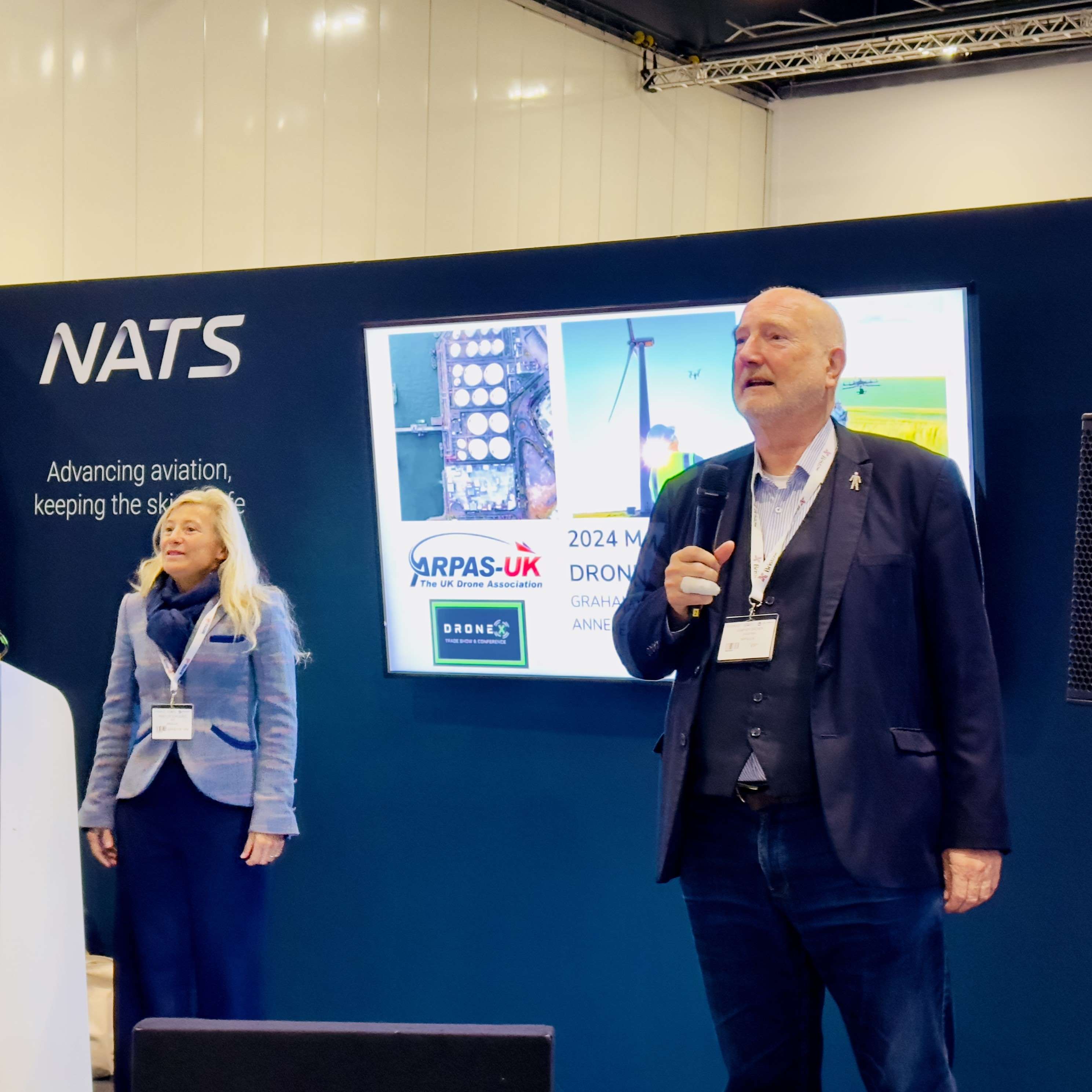
Graham Brown, Chair, and Anne-Lise Scaillierez, CEO delivered a keynote address on industry updates and ARPAS-UK activities to support the industry. Their presentation can be accessed in this password protected post – MEMBERS ONLY
Finally, Anne-Lise had the honour to be a judge together with Nicola Ridd, DfT, and Gary Smith, CAA, for the DroneX Advanced Air Mobility AAM Award. The jury delivered the AAM Award to Inteliports.

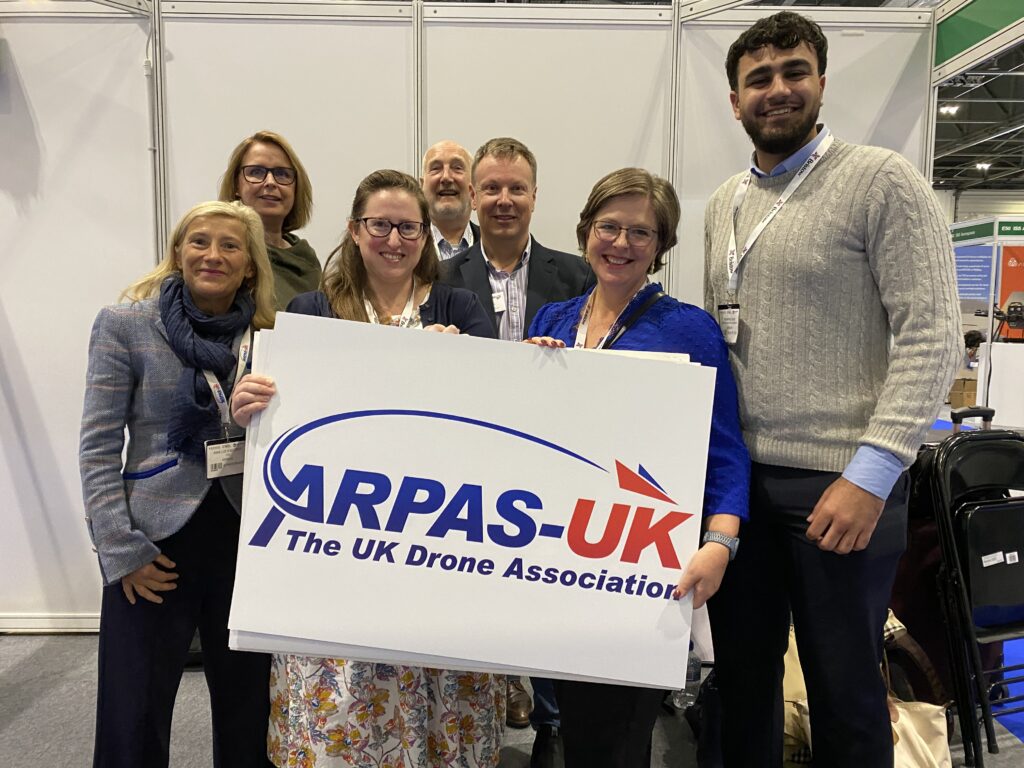
26 September 2024

Over the course of just 10 flying days, SkyLift successfully delivered 5,460 kg of cargo to 94 wind turbines—an impressive 94 deliveries! In one day alone, they moved 1,150 kg of cargo. This achievement showcases the power of precision and teamwork.
The 70 kg drones – which have a wingspan of 2.6 m – can transport up to 100 kg of cargo and will help improve operational efficiency and safety while reducing carbon emissions from operating an offshore wind farm.
In this specific case, Orsted decided to update some critical evacuation and safety equipment in each of the wind turbines at the Dutch offshore wind farm. Normally, a vessel would sail from one wind turbine to the next, using several different cranes to lift each box to the top of the wind turbine. Instead, the drone simply flew back and forth from an offshore supply vessel directly to the top of the nacelle, allowing the company to update the equipment 10-15 times faster than normally.
This pioneering move marks a significant leap forward in operational efficiency and safety in the offshore wind industry. The drone flight from the vessel to the turbine takes about four minutes per turbine, while the conventional approach without using drones can take approx. six hours. Taking vessel transport between the turbines and from-and-to shore into account, Ørsted has been able to complete the tasks at Borssele 10-15 times faster than normally.
Drones will reduce costs and time, improve operational safety and efficiency and will reduce carbon emissions due to fewer journeys by ship. This will all lead to further improve the commercial fundamentals of offshore wind for investors, governments, and corporations.
Read Moonrock’s interview with Harry Getliffe, COO of SkyLift.
Both SkyLift and Moonrock Drone Insurance are ARPAS-UK Members
21 August 2024

Project Skyway is part of Phase 3 of Innovate UK’s Future Flight Challenge Programme, exploring a drone superhighway for BVLOS flights.
Connected Places Catapult‘s role was to engage with various stakeholders to understand perceptions, expectations, and concerns about drones and BVLOS usage. Stakeholders see benefits like promoting UK innovation and enhancing sustainability but have concerns about the superhighway’s resilience and logistics.
Industry Perceptions: Industry stakeholders see potential benefits in sustainability, time-saving, and safety but have concerns about regulations, system resilience, and operational complexity
Report recommendations: The report concludes with recommendations on emphasizing transparent communication, independent regulation, and comprehensive risk mitigation to ensure successful implementation and public acceptance.
2 August 2024

Disclaimer: All jobs posted here are from LinkedIn and other job sites including member and non-member organizations.

ISS Aerospace is looking to recruit a UvX Software Systems Engineer.

Skyports are recruiting for several roles.

Skanska is looking to recruit an Engineering Surveyor Technician – Drone Pilot

Welsh Water are looking to recruit a UAV Drone Pilot

Panton McLeod is looking to recruit to their Graduate Programme, including working with drones
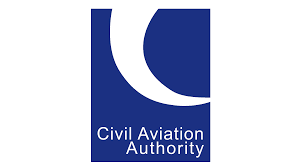
The CAA is looking to recruit an Airspace Modernisation Oversight – Associate

Archangel Imaging is looking to recruit an Embedded Software Engineer (AI for Drones)

Midwich are looking to recruit two roles:

Menapia are looking to recruit 4 roles:

QuadRotor Services Ltd is looking to recruit a Drone Pilot

Ajuno are looking to recruit a Lead Project Manager – Robotic Technologies

SORA Aviation are looking to recruit for three roles:
1) Senior/Principal Design Engineer – Propeller Hub & Dynamics
2) Senior/Principal Stress Engineer – Loads & Aeroelastics
3) Senior/Principal Engineer – Flight Dynamics & Simulation

Lincolnshire Police are looking to recruit a Deputy Chief Drone Pilot
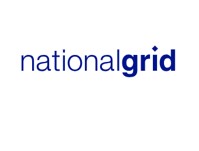
National Grid are looking to recruit a UAS Operations Lead

BAE Systems are looking to recruit a UAS Pilot

Sees.ai are looking to recruit a UAS Pilot Technician

Sonomatic are looking to recruit a Job: Senior UAV Operator / Project Manager.